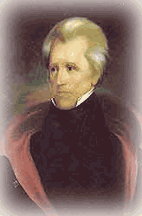Andrew Jackson was born in rural South Carolina on March 15, 1767, the son of impoverished Presbyterian Scotch-Irish immigrants. He received no formal education.
Young Jackson fought in the Battle of Hanging Rock (1197:Revolutionary War]), at the tender age of 13. He was captured by British forces and asked by an officer to shine his boots. Jackson refused and was struck with the flat side of a saber — an event that provoked his lasting hatred of the British.
 Following the War of Independence, Jackson followed several occupations, studied law and became a public prosecutor in western North Carolina (present-day Tennessee) in the new community of Nashville. Jackson became a land speculator and slave owner, who also developed a reputation for brawling.
Following the War of Independence, Jackson followed several occupations, studied law and became a public prosecutor in western North Carolina (present-day Tennessee) in the new community of Nashville. Jackson became a land speculator and slave owner, who also developed a reputation for brawling.
In 1791, Jackson married Rachel Robards. The couple mistakenly believed that her divorce from a previous husband had been finalized. It had not and the couple married again in 1794. Jackson was extremely protective of his wife and in 1806, killed Charles Dickinson in a duel stemming from uncomplimentary remarks by Dickinson about both Jackson and his wife. Jackson fought two duels in his life and Dickinson as the only man he killed.
In 1796, he became the first U.S. Representative from the state of Tennessee and later its first Senator. He returned to Tennessee and served as a state supreme court judge from 1798 to 1804. Jackson retired from the court and devoted his time to the development of his home, Hermitage, outside of Nashville.
During the War of 1812, Jackson took command of militia forces, but his mission was cancelled. While marching back to Tennessee, his soldiers experienced his toughness and dubbed him “Old Hickory.”
In 1814 during the Creek War, Jackson’s forces won a crushing victory at the Battle of Horseshoe Bend on the Tallapoosa River. The Creeks, allies of the British, were no longer a threat on the frontier, and Jackson was promoted to major-general. The highlight of Jackson`s military career was his victory over British forces at the Battle of New Orleans in January 1815. The British suffered more than 2,000 casualties while the American sustained six killed and 10 wounded. This victory helped to restore the nation’s pride following the embarrassing White House torching by the British and the government`s ignominious flight. Jackson emerged a national hero.
In 1817, Jackson was recalled to pursue Seminole forces, which had been staging raids into Georgia. Without authorization, he captured St. Marks and Pensacola and ordered the executions of two British citizens, an action that would be cited repeatedly by his future critics. Jackson resigned his command and served for a short time as the governor of Florida.
In 1823, Jackson was elected to the U.S. Senate and immediately regarded as a presidential possibility. In the Election of 1824, he garnered the most popular votes, but lacked an electoral majority. The House of Representatives selected his rival, John Quincy Adams.
Revenge was exacted in the Election of 1828. Jackson’s victory was regarded as the Revolution of 1828, marking the rise of popular political participation.
Andrew Jackson followed a very narrow interpretation of the constitution when it came to funding internal improvements. Like James Monroe, he held that funding could only be provided where the benefit accrued to the nation as a whole, and not a state or locality.
In 1830, an appropriation bill for the Maysville Road, a part of the Cumberland Road that Congress had authorized in 1806, reached Jackson`s desk. He vetoed the bill, stating that, "If it be the wish of the people that the construction of roads and canals should be conducted by the federal government, it is not only highly expedient but indispensably necessary that a previous amendment of the Constitution, delegating the necessary powers and defining and restricting its exercise with reference to the sovereignty of the states, should be made. Without it, nothing extensively useful can be effected."
Construction of the National Road, which eventually extended from the Potomac to Vandalia, Illinois, continued until 1838, but after Jackson`s veto there were no new highways constructed with federal funds for half a century.
Jackson’s two terms were notable for the Eaton affair, the struggle against the Second Bank of the United States, his nullification fight with John C. Calhoun, Jackson`s censure by the Senate, his use of the spoils system, the issuance of the Specie Circular and the recognition of Texan independence.
In July 1835, a South Carolina mob attacked the Charleston post office and succeeded in burning some abolitionist literature. President Jackson spoke against the distribution of "incendiary" material and in favor of legislation to restrict is distribution through the mail. His wishes did not become law, as Congress was not willing to let anyone, either a state or the President, censor the mail.
Jackson, plagued by ill health and financial woes, nevertheless remained active in Democratic politics after leaving office. He was particularly strong in his support of Martin Van Buren and later James K. Polk.
Jackson was in many ways a contradictory figure. Known as the hero of the common man, he owned a large plantation with slaves and had long been allied with the hard money and creditor interests in Tennessee politics.
Jackson also was inconsistent on the topic of states’ rights. He was willing to use armed might to quell the nullification forces of South Carolina, but later allowed Georgia to ignore Supreme Court orders related to the treatment of the Cherokees. The resulting Trail of Tears tragedy was certainly the low point in Jackson’s career.
Jackson was responsible for molding the modern presidency. He was the embodiment of the belief that the president was the only official who represented all of the American people.